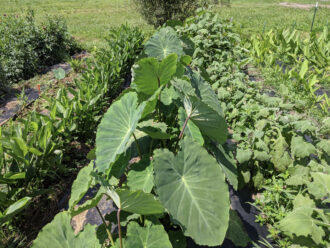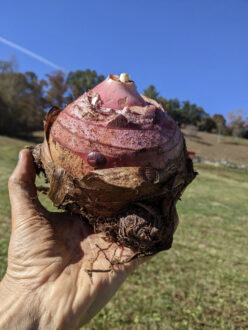ASHEVILLE, North Carolina – Farmers across the Southeast are catching on to the production ease, culinary connections, and value-added diversity of taro – an ancient root crop that has been an integral part of the diet of civilization for thousands of years.
With the right varieties, the tropical crop can be a viable, versatile, delicious, and nutritious alternative to traditional crops that may become more vulnerable to environmental challenges. Through on-farm trialing and regional farmer collaborations, the Utopian Seed Project -- a non-profit that focuses on crop diversification across the Southeast -- has identified several taro varieties that perform well under growing conditions in North Carolina, South Carolina, and Georgia.
Funded by a Southern Sustainable Agriculture Research and Education (SSARE) On-Farm Research Grant, the goal of the project was to increase farmer and consumer awareness of taro as a viable, resilient, and versatile crop, and introduce taro as a mainstream crop in the Southeast.

“Our work to grow taro in North Carolina aims to learn from a diverse network of farmers and chefs with authenticity and respect for the taro’s rich history, while also acknowledging that crops grown and consumed in new regions will adapt and meld in new and exciting ways,” said Chris Smith, Executive Director of Utopian Seed Project.
The two-year project was multifaceted. It involved field trials of varieties targeted for regional adaptability, plant performance, plant size, and yields; collecting farmer experiences on taro production from those in the Southeast already growing the crop; and collaborations with chefs and culinarians to showcase the crop’s versatility in dishes and broad value-added uses.
“We focus on a multi-stakeholder approach to introducing crops that are new to our region. The work is important and ongoing and involves a mixture of exposure and education,” said Smith. “Agronomic questions are very important, but there is little use in growing something if a farmer can’t sell it.”
Based on the results of the variety trials conducted at the Utopian Seed Project research farm, Elon University, and Warren Wilson College, taro emerged as a crop that is easy to grow, has good yields (with the right plant spacing), and can provide a low-input, insect-and disease-resilient alternative to other storage root crops. Additionally, consumers were introduced to demonstrations that showcased the crop’s versatility, ranging from nutritional and medicinal benefits, its use as flour, and a gluten and milk substitute.
A production guide covering the basics of taro, the variety trials, and culinary applications was developed. A factsheet on growing taro in the Southeast, complete with farmer experiences is also available.
View Related SARE Grant:
- Researching Colocasia esculenta (aka Taro) in the Southeast as a Sustainable and Alternate Crop (OS22-159)
